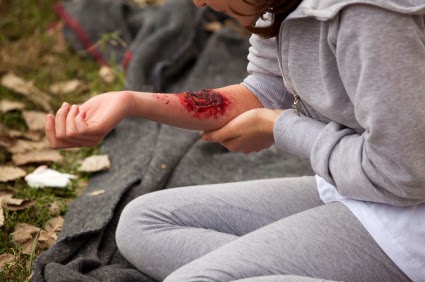Recently, I went to a nursing conference and part of the two day adventure was a discussion of ethics. There are always plenty of ethical issues going on in medicine these days (the Jahi McMath Case and the case of the Texas woman kept on life support for her unborn child to name two recent news headliners.)
The nursing researcher was discussing how to identify ethical issues early on and had developed a research based tool to aid medical staff in, perhaps, not letting these things get out of proportion-- say before the news media gets involved.
As part of her talk we answered questions about ethical scenarios. One scenario she presented was of a family whose child was admitted for pain of unknown origin and had frequent trips between the floor and the pediatric ICU for pain management. One question around this scenario was, "Unnecessary pain in children is the worst thing."
I disagree with this statement. Pain is necessary. It signals us to stop doing something when it is harmful to our bodies-- like touching a hot iron. Pain tells us, in differing degrees of severity, when we should seek medical attention. So, I think pain is good. What I would say is that "Uncontrolled pain in children is the worst thing."
Yes, that I would agree with.
Parents with children who have congenital insensitivity to pain wish pain upon their children. Yes, you read that correctly. They understand the purpose of pain and how it ultimately protects the human organism. In fact, children with this disorder often harm themselves because they can't feel pain such as gouging at their eyes to the point of injury. In this child's story below-- the parents talk about how, when she was a baby, they took her to an eye doctor and she had a large corneal abrasion and the infant never cried. That's how they diagnosed her. I can attest-- corneal abrasions (a scratch to the eyeball) are some of the most painful injuries there are and are one of the leading causes a crying, fussy infant is evaluated in the ER.
It is a rare, inherited autosomal recessive disease which means both parents have to be carriers and their offspring would have a 25% chance of fully expressing the disease. If you're a carrier, you can pass it on but are not symptomatic.
Here's one story about a family with a child with congenital insensitivity to pain.
So, no, pain is not always a bad thing.
Next post, I'll review a novel where an author used this congenital disorder.


















One of my friend's child has congenital insensitivity to pain and she is always worried about him lest he should get injured and bleed without even knowing that he has wounded himself. I can feel the agony of such parents and wish some day we have a cure to this disease.
ReplyDelete